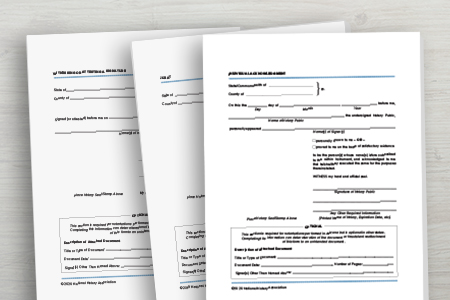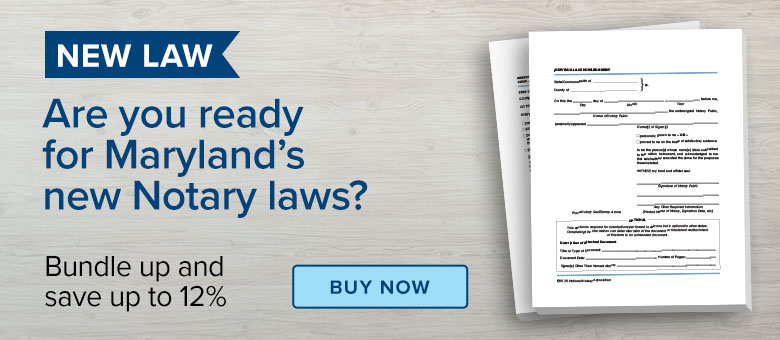 Maryland makes substantial changes to the state's Notary laws — from introducing new certificate forms to authorizing remote online notarization. Most of these new changes to state statutes are in effect now, but a follow-up bill (Senate Bill 636) gives the Secretary of State until October 1, 2021, to implement the education and exam requirements.
Maryland makes substantial changes to the state's Notary laws — from introducing new certificate forms to authorizing remote online notarization. Most of these new changes to state statutes are in effect now, but a follow-up bill (Senate Bill 636) gives the Secretary of State until October 1, 2021, to implement the education and exam requirements.
Notary law changes in effect now
Senate Bill 678 enacted provisions of the Revised Uniform Law on Notarial Acts (RULONA), which took effect on October 1, 2020. The bill introduces Notary certificate requirements, authorizes RON, defines satisfactory evidence of identity and revises the Notary application process.
New Maryland certificates
Notaries are now required to complete a notarial certificate for every act they perform. This was not always the case in the past, as the old law allowed Notaries to merely "stamp and sign" a document requiring the notarial act of signature witnessing.
Now, the new law prescribes several new short form certificates for all authorized notarial acts, including the act of signature witnessing. Notaries can find the new notarial certificates on the Maryland Secretary of State website. The NNA provides the new forms for free to NNA members and printed certificate pads are available for purchase.
Authorization of remote online notarization
Maryland authorizes the use of communication technology to notarize documents for remotely located individuals who do not physically appear before the Notary as long as the Notary is physically located within the state. Before Notaries can perform remote online notarizations, they must first notify the Secretary of State of their intent to perform such services as well as identify the technology they plan to use. Notaries are required to create and maintain a journal record and an audio-visual recording of all remote notarial acts.
Satisfactory evidence of identity defined
The new law also provides clearer standards for identifying document signers by personal knowledge or satisfactory evidence. The new law defines personal knowledge to mean: "The individual is personally known to the notarial officer through dealings sufficient to provide reasonable certainty that the individual has the identity claimed."
In addition, the law defines two forms of satisfactory evidence of identity.
The first form is to present a written form of identification, either a passport, driver's license, consular ID, government-issued non-driver ID card or another form of government ID issued to the individual. The ID must be current and unexpired, contain the signature and photo of the signer, and be satisfactory to the Notary.
The second form of satisfactory evidence is a verification on oath or affirmation of a credible witness who personally appears before the Notary and either is known to the Notary or whom the Notary can identify on the basis of a passport, driver's license, consular ID or government-issued non-driver ID card.
Notary commission application changes
SB 678 makes changes to the qualifications for a Notary commission. An applicant no longer must be a citizen or permanent legal resident of the U.S. but must either be a resident of Maryland or have a place of employment or practice in Maryland. The major change, however, is a new mandatory education course required for all first-time and renewing applicants. First-time Notary applicants are also required to pass an exam.
Changes coming soon
The Secretary of State will provide details for the required training and exam in the coming year. Senate Bill 636 gives the Secretary until October 1, 2021, to prepare for the implementation of both requirements. The course of study and exam will cover the laws, regulations, procedures and ethics relevant to notarial acts.
Visit the NNA Law Updates Database to learn more about Senate Bill 678 and Senate Bill 636.
Rachel Fraser is the Content Marketing Specialist at the National Notary Association.
